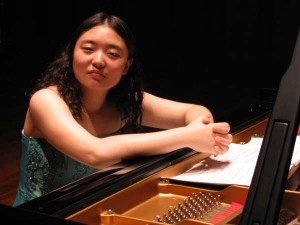
Plenty of Pianists, a Monteverdi Milestone, and a New String Quartet
Pianist Ran Jia. This is a good week for true fans of pianism and early music, with two major multi-day events for devotees of those disciplines.
The Miami International Piano Festival opens tomorrow and runs through Sunday, with established and up-and-coming players alike taking the stage at the Lincoln Theatre on Miami Beach. Names familiar to local concertgoers – Kemal Gekic, Ilya Itin, Misha Dacic, Jorge Luis Prats – are on hand, as are two younger pianists on the rise, 14-year-old Aristo Sham of Hong Kong and 21-year-old Ran Jia, born in Chengdu, China, and now living in Philadelphia, where she studies at the Curtis Institute.
I heard Jia earlier this year in recital on the campus of Palm Beach State College in Lake Worth, and she’s an accomplished, powerful player who surely has a good career ahead of her. I liked her Brahms First Sonata in particular; this is a tough, ungratefully written work that she managed to bring off with style and swagger.
Other interesting events on the programs include a piano quintet version of the Chopin Second Concerto to close out the festival Sunday. I’ve caught a couple festival concerts over the years, and it’s always nice to commune with members of what you know to be a hardcore piano audience. (Here’s the festival’s YouTube channel and its Website, which this morning was temporarily unavailable.)
Meanwhile, Saturday marks the 443rd anniversary of the birth of the great Italian composer Claudio Monteverdi, and the Seraphic Fire concert choir, joined by the Western Michigan University Chorale and the Firebird Chamber Orchestra, will be in the middle of celebrating one of Monteverdi’s greatest achievements.
This is the Vespro della Beata Vergine, printed 400 years ago this July in Venice, where Monteverdi would cap his career, and known familiarly as the Vespers of 1610. Monteverdi is seen as a transitional figure from the Renaissance to the early Baroque, and there is a lot of this splendid work that can sound archaic if you’re not used to it.
But Seraphic Fire’s 400th anniversary celebration of this work is a milestone for Patrick Dupré Quigley’s choir, and it comes at the end of a season that has seen this group do remarkable concerts of the German Baroque, including a stunning reading of George Frideric Handel’s Israel in Egypt. The choir did a version of this work in reduced form a few years ago, but this time they’re doing it up big by bringing in their friends from Kalamazoo (chorale director James Bass is a longtime member of Seraphic Fire).
The two groups have just recorded this work, and I’m eager to hear how it came out. I’ve written about Seraphic Fire several times on this blog, but the concerts I’ve heard this year have been even better than the impressive concerts they’ve given in previous seasons, and it just might be that this ensemble is moving to a higher level.
Also this weekend is the second concert by a brand-new chamber group, the Fort Lauderdale String Quartet. Its first and second violinists are the husband-and-wife team of Laszlo Pap and Claudia Cagnassone, Scott O’Donnell is in the viola chair, and Christopher Glansdorp is the cellist. All four of these musicians have played many a concert in the area for many a year, and they made their debut last month at the Hyatt Regency Pier 66 on the 17th Street Causeway in Lauderdale, where they’ll be Sunday afternoon.
On the program is music of Schubert (the Death and the Maiden quartet), Puccini (Crisantemi), Shostakovich (Two Pieces for String Quartet, Op. 36) and excerpts from quartets by Haydn (the finale of No. 32 in C, The Bird), and Beethoven (the finale of the Quartet No. 2 in G, Op. 18, No. 2).
It’s a busy week of music (not to mention the final two performances of Florida Grand Opera’s Carmen at the Broward Center), and connoisseurs in particular will have plenty to look forward to.
Recent Content
-
Artsarticle ·
-
Artsarticle ·
-
Artsarticle ·
